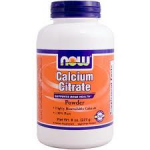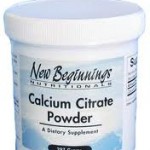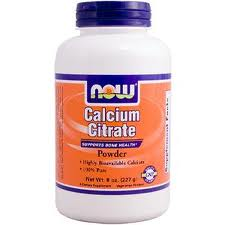Calcium supplements exist in different compounds — calcium citrate, calcium carbonate, calcium gluconate, calcium lactate, calcium lactate gluconate and calcium pyruvate.
 Although all of these provide calcium, the value of each compound depends on different factors like concentrations and absorption capabilities. Calcium citrate is 21 percent elemental calcium, one of the highest concentrations available in a compound, and has the best absorption rate of calcium supplements. Keep in mind the calcium content is only one factor. Bioavailability, or absorption rate, solubility, interactions with other medications or supplements, specific medical conditions of the individual, taste and cost are other factors to consider when selecting a calcium product.
Although all of these provide calcium, the value of each compound depends on different factors like concentrations and absorption capabilities. Calcium citrate is 21 percent elemental calcium, one of the highest concentrations available in a compound, and has the best absorption rate of calcium supplements. Keep in mind the calcium content is only one factor. Bioavailability, or absorption rate, solubility, interactions with other medications or supplements, specific medical conditions of the individual, taste and cost are other factors to consider when selecting a calcium product.
Calcium citrate is a salt of calcium and citric acid, forming a somewhat sour-tasting food grade nutritional product. Beyond its use as a dietary supplement, calcium citrate is also frequently used as a food additive to impart a sour taste to foods, as a food preservative and as a water softener because the citrate ions can chelate unwanted metal ions.
While calcium citrate and calcium carbonate are both calcium, calcium carbonate, the form most commonly found in dietary supplements, needs gastric acid to be optimally digested and absorbed. It is therefore not the best option for those who have had gastric bypass surgery or people who routinely use medication to suppress stomach acid.
Calcium citrate can be digested even by those with little or no gastric acid.
Calcium is the most abundant mineral in the human body and is vital to proper function of the body. Having the right amount of calcium is crucial for building and maintaining strong bones. The body will actually take calcium from bones if there are low calcium levels. Cellular functioning, blood clotting, muscle contraction, nerve impulse transmission, and healthy teeth formation are all affected by calcium levels in the body. Calcium can also bind to other minerals and assist in eliminating them from the body.
Calcium naturally exists in many foods, including dairy products, seaweed, quinoa, beans and nuts. Yet some people suffer from a disorder known as hypocalcemia, a calcium deficiency in the blood. The most common cause of hypocalcemia is vitamin D deficiency, due to poor diet or lack of exposure to the sun. This is because adequate amounts of vitamin D are required for proper absorption of calcium.
Benefits of Calcium Citrate
 Aside from maintaining strong bones and teeth, calcium is required for muscle contraction, nerve conduction, the beating of the heart, blood coagulation, glandular secretion, energy production and immune function.
Aside from maintaining strong bones and teeth, calcium is required for muscle contraction, nerve conduction, the beating of the heart, blood coagulation, glandular secretion, energy production and immune function.
Keeping up with calcium requirements can help avoid breaks and strains on bones.
Purity and Concentration of Calcium Citrate
This calcium citrate powder contains no fillers, additives or anti-caking agents. You will receive a resealable bag of this powder. Store in a cool, dry area protected from light. Reseal after each use.
Potential Side Effects of Calcium Citrate
Calcium in excess of 2.5 grams daily can cause mineral imbalances (impaired zinc or iron absorption). Minor gastrointestinal side effects, headaches, irregular heartbeat and increased urination may occur from taking excessive amounts of calcium citrate.
Suggested Use of Calcium Citrate
While natural foods provide the best sources of calcium (one serving of a dairy product provides 300 mg of calcium) those who do not consume enough calcium from food sources may need to supplement their daily requirement.
The recommended serving size for calcium citrate is 2400 milligrams taken once or twice daily, depending on individual needs. As you can see from the full bulk density/volumetric conversion chart for Calcium Citrate, a 1/4 teaspoon serving is equivalent to 790 mg, so a serving of 3/4 teaspoon is equivalent to 2370 mg.
Because calcium citrate is 21 percent elemental calcium, taking 2400 milligrams of calcium citrate powder in a single serving will yield about 500 milligrams elemental calcium.
The FDA recommends a Daily Value(DV) of 1000 mg of calcium. A serving of 2400 mg calcium citrate, yielding 500 mg calcium, will provide 50% of the Daily Value for adults and children four or more years of age.
The FDA recommends the following Daily Intake Values of Calcium: Infants, 600mg; children Less than 4 years of age, 800 mg; pregnant and lactating women, 1300 mg.
 DO NOT take calcium citrate or antacids containing calcium without first talking to your doctor if you are currently taking other medications. Calcium can diminish the potency of other medicines by binding to them or by changing the acidity of the stomach or the urine. Check with your doctor if you have had kidney stones, parathyroid gland disease or if you take antacids, tetracycline antibiotics or other calcium supplements.
DO NOT take calcium citrate or antacids containing calcium without first talking to your doctor if you are currently taking other medications. Calcium can diminish the potency of other medicines by binding to them or by changing the acidity of the stomach or the urine. Check with your doctor if you have had kidney stones, parathyroid gland disease or if you take antacids, tetracycline antibiotics or other calcium supplements.
Bioavailability, Mixing and Solubility of Calcium Citrate
Calcium citrate is considered to have a higher bioavailability than most other common and less expensive counterparts, like calcium carbonate. Taking a vitamin D supplement together with calcium makes it easier to be absorbed, allowing it to be quickly dispersed throughout the body.
Calcium citrate is poorly soluble in water. Taking calicum citrate with cold orange or lemon juice increases its solubility. Calcium citrate can be taken on an empty stomach.
